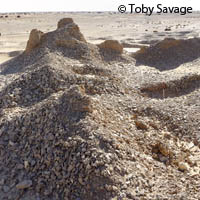ERC researchers discover lost civilisation in Sahara
An EU-funded team of archaeologists has unearthed the remains of a lost civilisation of the Sahara, in one of the harshest parts of the African desert. The result is an outcome of the TRANS-SAHARA ('State formation, migration and trade in the central Sahara (1000 BC-AD 1500)') project, which received a European Research Council (ERC) Advanced Grant worth EUR 2.42 million under the EU's Seventh Framework Programme (FP7). Researchers from the University of Leicester in the United Kingdom used satellite imagery to find new evidence of a lost civilisation in the Libyan part of the desert. They discovered over 100 fortified farms and villages with castle-like structures as well as a number of towns. The majority of these date from AD 1 to AD 500. According to the researchers, the Garamantes, a Saharan Berber people who founded a kingdom in modern-day Libya, developed these 'lost cities'. Experts suggest the Garamantes were culturally and historically more advanced and significant than previously considered by ancient sources. The Leicester team discovered the mud brick remains of the castle-like complexes, which contained walls with heights of up to 4 metres. But there's more: they also found traces of dwellings, cairn cemeteries, associated field systems, wells and advanced irrigation systems. A ground survey conducted a few months ago confirmed the pre-Islamic date and preservation of these items. Commenting on the project funding, Professor Henrietta L. Moore, William Wyse Chair of Social Anthropology at the University of Cambridge and a member of the ERC's Scientific Council, said: 'In the ERC, we are very proud to fund excellent researchers such as archaeologist David Mattingly and his team. When the ERC awarded him an Advanced Grant, we firmly believed that his project had the potential to go beyond the frontiers of knowledge and would be essential in getting to know Libya's cultural heritage. Then it took a dramatic turn with the anti-Gaddafi revolt which forced the team to evacuate the country.' The revolt against the Muammar Gaddafi regime may have interrupted Professor Mattingly and his team from their work, but Professor Moore noted that they would return to Libya in order to continue their ground survey with the same enthusiasm when this is possible. 'We are confident that he will continue his important exploration of the exceptional archaeological treasures of this region.' Project leader Professor Mattingly said: 'It is like someone coming to England and suddenly discovering all the medieval castles. These settlements had been unremarked and unrecorded under the Gaddafi regime.' Added Dr Martin Sterry, also of the University of Leicester, who led much of the image analysis and site interpretation: 'Satellite imagery has given us the ability to cover a large region. The evidence suggests that the climate has not changed over the years and we can see that this inhospitable landscape with zero rainfall was once very densely built up and cultivated. These are quite exceptional ancient landscapes, both in terms of the range of features and the quality of preservation.' The results challenge what people thought in the past: that the Garamantes were barbaric nomads who only caused trouble during the Roman Empire. 'In fact, they were highly civilised, living in large-scale fortified settlements, predominantly as oasis farmers,' explained Professor Mattingly. 'It was an organised state with towns and villages, a written language and state-of-the-art technologies. The Garamantes were pioneers in establishing oases and opening up trans-Saharan trade.' This project and the findings that have emerged help pave the way for a new beginning for Libya and its people and their engagement with their history. 'It is a new start for Libya's antiquities service and a chance for the Libyan people to engage with their own long-suppressed history,' Professor Mattingly underlined. 'These represent the first towns in Libya that weren't the colonial imposition of Mediterranean people such as the Greeks and Romans. The Garamantes should be central to what Libyan school children learn about their history and heritage.'For more information, please visit: University of Leicester:http://www2.le.ac.uk/ERC:http://erc.europa.eu/TRANS-SAHARAhttp://www2.le.ac.uk/departments/archaeology/research/projects/the-trans-sahara-project
Countries
United Kingdom



